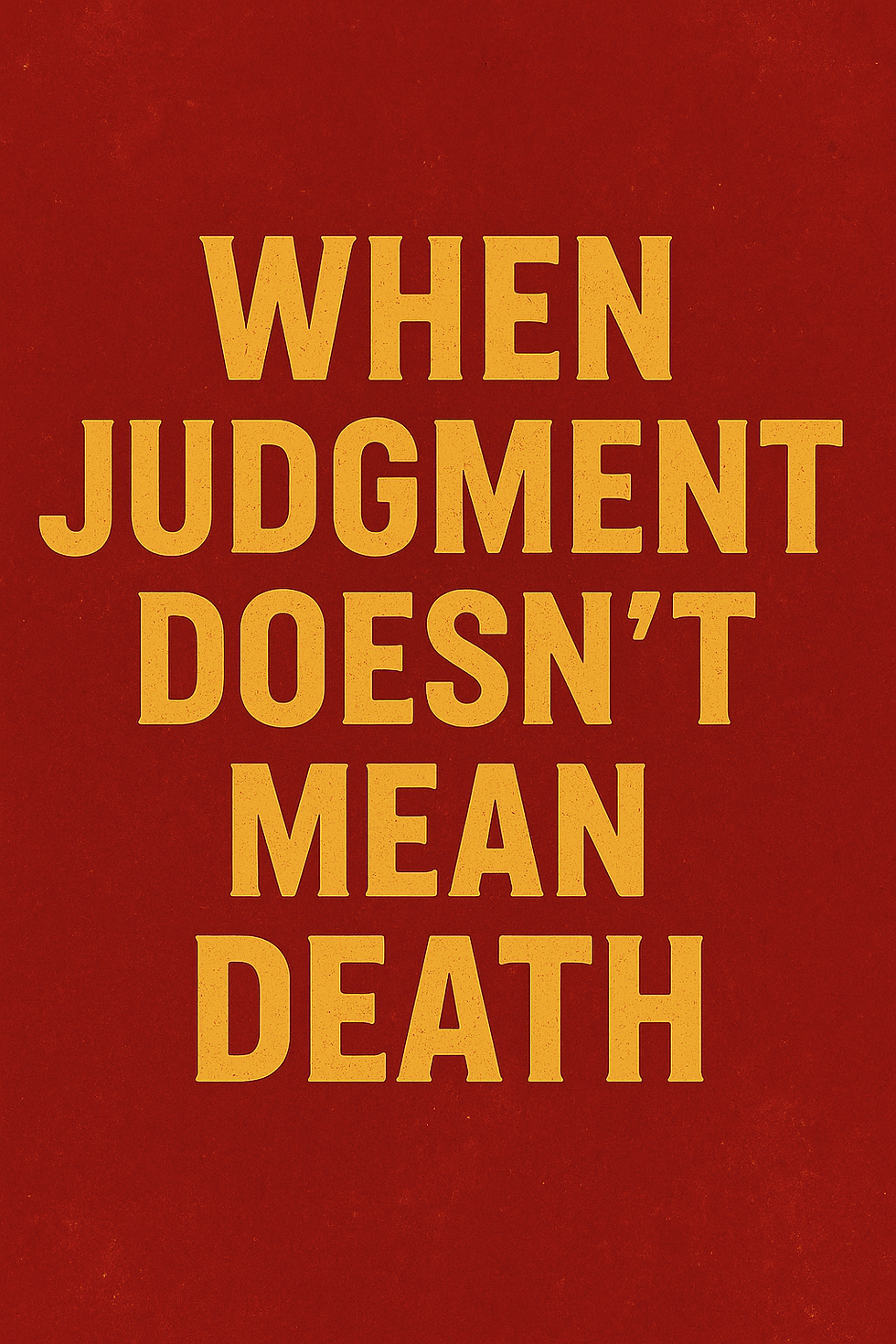When Judgment Doesn’t Mean Death: Understanding God’s Justice Without Fear
- dktippit3
- Aug 5, 2025
- 4 min read
Updated: Aug 7, 2025

For many, the word “judgment” feels like a death sentence. It evokes images of wrath, fire, and irreversible consequences. And yes — Scripture contains moments where judgment is swift, severe, and final. But the Bible also paints a richer, more nuanced portrait of God’s justice.
Not all judgment leads to death. In fact, not all judgment is punishment. Sometimes it's discipline. Sometimes it’s exposure. Sometimes it’s even mercy.
Understanding the difference matters — because it shapes how we see God and how we respond to Him.
Judgment Is Not Always Condemnation
We tend to associate judgment with finality. But biblically, “judgment” can mean any number of actions that flow from God's holy evaluation of people or situations.
In the Bible, God’s judgments include:
Consequences for sin (Genesis 3)
Correction and discipline (Hebrews 12)
Delayed punishment (Romans 2:4–5)
Final condemnation (Revelation 20)
Restoration and mercy (Micah 7:18–19)
Judgment is God’s decision — and like any good judge, He knows when to issue a sentence, when to show leniency, and when to offer a second chance.
Examples of Judgment That Didn’t End in Death
Let’s look at moments in Scripture where God judged — but didn’t destroy.
King David (2 Samuel 12)
After David’s sin with Bathsheba, God sends Nathan to confront him. The judgment is clear: David’s actions have consequences — the child will die, his household will face division, and his reign will not be without pain.But David is not executed. He is broken, repentant, and restored.
“The Lord also has put away your sin; you shall not die.” (2 Sam. 12:13)
Elijah and the Still Small Voice (1 Kings 19)
Elijah runs, broken and afraid, after calling fire down on Mount Carmel. He expects judgment — maybe even death. But instead, God meets him with a whisper.The judgment Elijah needed wasn’t fire… it was a reset. A reminder. And God gave it gently.
Jonah and Nineveh (Jonah 3)
God’s declared judgment on Nineveh was clear: “Yet forty days, and Nineveh shall be overthrown!” (Jonah 3:4)But when the people repented, God relented.
“When God saw what they did… He relented of the disaster.” (Jonah 3:10)The judgment was real — but so was the mercy.
Why Doesn’t Judgment Always Mean Wrath?
Because God’s judgments reflect His character, not just our crimes. He is:
Holy – He cannot ignore sin.
Just – He must deal with evil.
Patient – He delays judgment to give space for repentance (2 Peter 3:9).
Loving – His goal isn’t destruction, but redemption.
God's wrath is His response to sin. God's judgment is His decision about what to do in light of that sin. And sometimes, His judgment withholds wrath, because He desires mercy.
Judgment as Discipline, Not Death
Hebrews 12 is a key passage here:
“The Lord disciplines the one he loves, and chastises every son whom he receives.” (Hebrews 12:6)
Discipline is a form of judgment — but it’s for our good, not our ruin. It’s meant to train, correct, and restore.
If you’re a believer, this is good news.
God’s judgment may feel hard, but it is never aimed at your destruction. He may expose your sin — but only to heal what’s broken. He may remove something from your life — but only to make room for something better.
Final Judgment Still Exists — But So Does the Cross
It’s important not to overcorrect.
Yes, not all judgment leads to death. But some judgment does.
There will come a time when God judges the living and the dead (Revelation 20). For those who have rejected His grace, that judgment will be final.
But for those who are in Christ:
“There is now no condemnation…” (Romans 8:1)
Because God’s judgment already fell — on Jesus. The cross is where wrath and mercy meet. The death that sin demanded was poured out — not on us, but on the Savior who stood in our place.
So What Should We Do With This?
If you’re a believer, take comfort. God’s judgment of your sin is finished — and His discipline is proof of His love.
If you’re not yet following Christ, take the invitation seriously. The judgment you fear has already been absorbed… if you’ll receive the One who took it for you.
God’s Justice Shouldn’t Make You Hide — It Should Make You Run to Him
God’s judgment is not the unpredictable wrath of a tyrant. It is the holy, measured, consistent decision of a God who loves justice and mercy. Who delays punishment to give us time to repent. Who sacrificed Himself to satisfy His own standard of righteousness.
So when you hear the word “judgment,” don’t run in fear.Let it drive you to the cross. Let it deepen your trust. Let it remind you that a God who judges rightly is also a God who saves completely.
Let me know in the comments: Have you experienced God’s discipline in a way that changed you? How has His judgment shaped your view of His mercy?
.png)



Comments